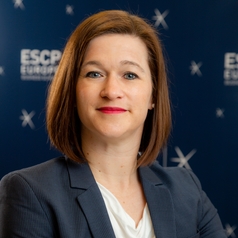The war in Ukraine shows humanity at its worst and at its best. While it is humans who cause the suffering, many also step up, reach out, and volunteer to help those in need.

Charlotte Traeger
Postdoctoral research fellow, Hertie School of Governance

Debbie Haski-Leventhal
Associate Professor in Management, Macquarie Graduate School of Management

Kerstin Alfes
Professor of management, ESCP Business School
In Lviv, Western Ukraine, Artem Mokrenet left his job as an interior designer to help refugees at the Ukrainian border, the Australian outlet ABC reports. At night, he dons a yellow vest and provides guidance to those searching for trains out of danger zones. Other volunteers strive to supply food, clothing, blankets, or free car rides, sometimes at the risk of their lives.
A world running on good deeds
While the situation in Ukraine is exceptional, volunteers’ non-remunerated presence is not. In 2021, more than 860 million adults over the age of 15 volunteered every month across the globe, according to the United Nations. This equals over 100 million full-time employees worth 1.348 trillion US dollars, or 2.4% of the entire global economy.
Heavily dependent on volunteers, non-profit organisations (NPOs) must ensure their workforce is satisfied of their experience if they are to retain them.
Research into how to manage volunteers is one route to guarantee they stay onboard during the global refugee crisis. Scholars investigating the experience of Syrian and Afghan refugees in Germany have called to adopt “unconventional management approaches” to speed their integration.
Of particular interest in this respect is research on organisation socialisation, or the process by which an individual comes to appreciate the values and behaviours of the organisation for which they work, moving from outsider to insider.
The risk of emotional exhaustion
A study that we published in April 2021 in the journal Human Relations can shed light on the current situation in the Ukraine. It was the first large-scale qualitative study to examine volunteers’ socialisation in the context of refugee help. Based on 42 in-depth interviews, it delves into the experiences of volunteers in three organisations working with refugees and migrants in France and four in Australia.
The volunteers’ work was varied. Some provided legal advice on obtaining refugee status or a home in their host country, while others delivered goods and furniture, provided sports training or school support for children. Given the challenging context, many volunteers grappled with emotional challenges. One, who worked several days a week helping refugees, expressed frustration at seeing the number of those in need continuing to rise. Others feared not knowing how to support them or react in difficult situations.
Our study reveals non-profit organisations can reduce their workforce’s stress levels by paying particular attention to their well-being during the stage of onboarding. Referred to in managerial psychology as the entry phase, it can make or break a volunteer’s ability and determination to stay within an organisation.
How to master the stage of onboarding: a guide
We found there are three concrete actions that NPOs can take to ensure that the entry phase is successful.
- Provide training activities and content that support role learning and self-reliance – for example, some organisations showed films on refugees’ typical journeys and the challenges they faced. A detailed observation phase, done face to face or online, can help address volunteers’ needs and expectations, reduce stress and become effective faster. Role playing exercises also boosted workers’ confidence.
- Hold both formal and informal meetings with team members to enhance team cohesion. Formal meetings could be a weekly lunch with the team, while informal ones, such as sharing a bus ride, are equally important. NPOs need to find creative ways to include volunteers in the socialisation process and build connections within the team and to the organisation itself.
- Make professional psychologists available to provide emotional support to volunteers when needed. This is not a necessarily a mandate for an in-house psychotherapist. Instead, NPOs can creatively tap into external resources, such as by partnering with organisation to assist distressed volunteers. For example, one Australian organisation involving university students in helping refugees collaborated with campus support to offer such services.
When the above actions were taken, volunteers became more skilled at supporting refugees while protecting their own well-being. One volunteer told us:
“When I first started, I was a little withdrawn because I did not really understand how it all worked and did not want to do anything I was not meant to do, but I am getting more confident.”
Lessons for Ukraine’s volunteers
Our findings may speak directly to volunteers currently working around the clock to support Ukrainian refugees. When assisting those facing displacement, the loss of loved ones, and an unknown future, volunteers also need to be aware of the emotional challenges they face, including frustration, stress and even fear.
Training sessions, events, and informal and formal meetings can all help take the edge off volunteers’ experience. In the long run, workers reap the benefits of a higher sense of self-reliance, social cohesion with their peers, and organisational belonging.
This article was originally published by The Conversation under the Creative Commons licence.
License and Republishing
The Choice - Republishing rules
We publish under a Creative Commons license with the following characteristics Attribution/Sharealike.
- You may not make any changes to the articles published on our site, except for dates, locations (according to the news, if necessary), and your editorial policy. The content must be reproduced and represented by the licensee as published by The Choice, without any cuts, additions, insertions, reductions, alterations or any other modifications.If changes are planned in the text, they must be made in agreement with the author before publication.
- Please make sure to cite the authors of the articles, ideally at the beginning of your republication.
- It is mandatory to cite The Choice and include a link to its homepage or the URL of thearticle. Insertion of The Choice’s logo is highly recommended.
- The sale of our articles in a separate way, in their entirety or in extracts, is not allowed , but you can publish them on pages including advertisements.
- Please request permission before republishing any of the images or pictures contained in our articles. Some of them are not available for republishing without authorization and payment. Please check the terms available in the image caption. However, it is possible to remove images or pictures used by The Choice or replace them with your own.
- Systematic and/or complete republication of the articles and content available on The Choice is prohibited.
- Republishing The Choice articles on a site whose access is entirely available by payment or by subscription is prohibited.
- For websites where access to digital content is restricted by a paywall, republication of The Choice articles, in their entirety, must be on the open access portion of those sites.
- The Choice reserves the right to enter into separate written agreements for the republication of its articles, under the non-exclusive Creative Commons licenses and with the permission of the authors. Please contact The Choice if you are interested at contact@the-choice.org.
Individual cases
Extracts: It is recommended that after republishing the first few lines or a paragraph of an article, you indicate "The entire article is available on ESCP’s media, The Choice" with a link to the article.
Citations: Citations of articles written by authors from The Choice should include a link to the URL of the authors’ article.
Translations: Translations may be considered modifications under The Choice's Creative Commons license, therefore these are not permitted without the approval of the article's author.
Modifications: Modifications are not permitted under the Creative Commons license of The Choice. However, authors may be contacted for authorization, prior to any publication, where a modification is planned. Without express consent, The Choice is not bound by any changes made to its content when republished.
Authorized connections / copyright assignment forms: Their use is not necessary as long as the republishing rules of this article are respected.
Print: The Choice articles can be republished according to the rules mentioned above, without the need to include the view counter and links in a printed version.
If you choose this option, please send an image of the republished article to The Choice team so that the author can review it.
Podcasts and videos: Videos and podcasts whose copyrights belong to The Choice are also under a Creative Commons license. Therefore, the same republishing rules apply to them.





